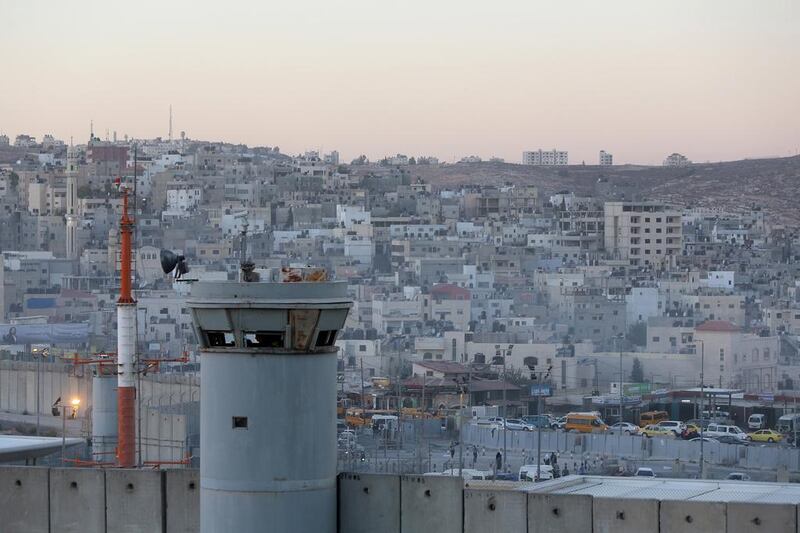Hugh Naylor
RAMALLAH // Vera Baboun is desperate to relieve Bethlehem’s 33,000 residents of chronic joblessness by stimulating a tourism industry that holds immense potential.
As the city’s mayor, she and fellow Palestinian officials have pleaded with Israeli authorities to allow the city to expand to accommodate its growing population and make room for new businesses. But their pleas have been in vain.
Like other Palestinian cities in the West Bank, Bethlehem is surrounded by Jewish settlements and Israeli land restrictions that severely limit both municipal and economic expansion.
That with traffic gridlock at Israeli checkpoints surrounding the city and an eight-metre high separation wall running next to it creates the conditions for an unemployment rate of 25 per cent.
But restaurants and hotels should be full, Ms Baboun said, with visitors to what is said to be the birthplace of Jesus.
“All of these issues affect us on so many levels economically,” said Ms Baboun. “When tourists come, they step off a bus for a while to tour the Church of Nativity, go into a souvenir shop or two and then often go back to Jerusalem. They rarely stay longer than a day.”
According to a report issued yesterday by the World Bank, Bethlehem is not the only Palestinian city failing to realise its economic potential under a 46-year Israeli occupation.
In the most detailed estimation of the economic potential lost because of the occupation, the report said the Palestinian Authority’s gross domestic product could expand by as much as US$3.4 billion — more than a third of its current level — if it could access the 61 per cent of the West Bank that Israel directly administers, known as Area C.
Under the 1990s Oslo Accords, the West Bank was divided into varying degrees of Israeli administration. As a result the Palestinian urban areas cannot expand, driving up rents and making running a businesse more expensive.
In Ramallah, Ali Awartani’s upscale neighbourhood of Masyoun is unable to spread to the sprawling, adjacent hillside. The land falls within Area C and overlooks Israel’s 443 Highway, which cuts deep into the West Bank even though Palestinians from the territory are forbidden to drive on it.
“This is all wasted land that could be used for business, houses,” said Mr Awartani, 40, who runs a business called akluna that promotes and sells traditional Palestinian food internationally. “But it’s empty because it’s just intended to secure that Israeli road.”
The complexities of the way the administrative zones were drawn up also allow for some unusual loopholes for some Palestinian small-business owners, such as Wafa Umm Mujahed, 42. She manages a grocery on the northern fringes of Ramallah that is within walking distance of the Israeli settlement of Beit El.
Because her business happens to fall in Area C, she pays no taxes to the cash-strapped PA. But the Palestinian businesses just across the street from her shop, which happen to fall in the Palestinian-controlled Area A, do.
“It’s an arbitrary arrangement,” she said. “Everyone over there pays taxes, but thanks be to God, I don’t.”
Few expect Israel to relinquish its control over Area C, which is home to the West Bank’s 300,000 Jewish settlers and a valuable source of minerals and water for Israel and its industries.
It may be no coincidence then that, according to the World Bank report, less than one per cent of Area C is available for Palestinian transportation, development, agriculture or trade.
“The Oslo process, which has never delivered a final-status arrangement, has instead left the Palestinian economy with very little resources to grow,” said Samir Abdullah, director general of the Ramallah-based Palestine Economic Policy Research Institute.
Mr Abdullah said this created a Catch-22 situation where the Palestinian leadership is forced to abide by a failed Oslo framework that still allows Israel to exploit West Bank resources.
“The colonisation is happening at our expense in more ways than one,” Mr Abdullah said.
Back in Bethlehem, Ms Baboun is trying to devise ways to get the 2.6 million tourists who visit the city annually to stay longer and spend money.
“If you go to the Vatican City or Beijing, you see tourists walking in the streets, talking to the people, spending days there shopping,” she said.
“But that’s not what is happening in Bethlehem. It’s a quick visit and they go.”
hnaylor@thenational.ae
* This story has been corrected since publication. Area A is controlled by Palestinians and not Israelis, as originally stated.





